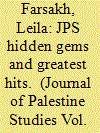|
|
|
Sort Order |
|
|
|
Items / Page
|
|
|
|
|
|
|
| Srl | Item |
| 1 |
ID:
061702


|
|
|
|
|
| Publication |
Spring 2005.
|
| Summary/Abstract |
The Palestinian state remains an internationally endorsed project, yet an increasingly difficult one to implement. By analyzing the territorial, legal, and demographic developments that took place in the West Bank and the Gaza Strip over the past ten years, this article assesses the extent to which the prospective Palestinian state has become unattainable. A comparison between the South African apartheid experience and the Israeli-Palestinian conflict is made to shed light on the ways in which the Palestinian territories are becoming analogous to Bantustans. While historical comparisons are never exact or prescriptive, they raise interesting parallels whose implications need to be considered, if not altered, in any attempt to materialize the project of viable Palestinian independence.
|
|
|
|
|
|
|
|
|
|
|
|
|
|
|
|
| 2 |
ID:
178337


|
|
|
|
|
| Summary/Abstract |
Examining the Journal’s fifty-year trajectory documenting the political economy of Palestine and of the Palestinians (not one and the same), author Leila Farsakh highlights contributions by a rich mix of economists, anthropologists, and other scholars: from Yusif and Rosemary Sayigh, Sara Roy, George Abed, Raja Khalidi, and Linda Tabar to Darryl Li, Judith Gabriel, Nicholas Pelham, Sobhi Samour, Omar Jabari Salamanca, and Helga Tawil-Souri (to name only some). Taken together, Farsakh argues, their writings expose “the diversity of Palestinian economic realities,” and highlight the continuing relevance of the settler-colonial paradigm as “the most useful analytic for understanding the Palestinian economic predicament.” Far from being a neutral technocratic process, economic development is “embedded in power structures that need to be dissected and understood at both macro and micro levels.”
|
|
|
|
|
|
|
|
|
|
|
|
|
|
|
|
| 3 |
ID:
102014


|
|
|
|
|
| Publication |
2011.
|
| Summary/Abstract |
As the Israeli-Palestinian peace process continues to stalemate, voices calling for an inclusive single state in Israel/Palestine as an alternative to the two-state solution have grown louder. This article reviews the Palestinian debate around the one-state solution and analyzes the challenges its advocates face in generating political support, central among which is the difficulty of redefining the Palestinian cause in terms of a struggle for equal political rights within a single polity rather than in terms of a struggle for a separate state.
|
|
|
|
|
|
|
|
|
|
|
|
|
|
|
|
| 4 |
ID:
144592


|
|
|
|
|
| Summary/Abstract |
This article reflects on the body of knowledge that has been constructed around the Palestinian economy. It traces the paradigm shifts between the two most commonly used theoretical frameworks—neoliberalism and colonialism—and assesses their success in analyzing and explaining the determinants of Palestinian economic growth. The Zionist project itself as well as the significant disparities between the various Palestinian communities that exist (inside Israel, in the occupied territories, and in the diaspora) have figured unevenly or not at all in scholarly analyses. The paper argues that as a result, the scholarship on the Palestinian economy has been quite inconsistent. The discussion seeks to demonstrate that this inconsistency has compromised the ability of economists both to explain the failure of Palestinian development and to identify possible remedies.
|
|
|
|
|
|
|
|
|
|
|
|
|
|
|
|
| 5 |
ID:
155909


|
|
|
|
|
| Summary/Abstract |
This paper reexamines the Palestinian struggle for self-determination and the extent to which a viable two-state solution to the Israeli-Palestinian conflict was ever truly possible. Such a reexamination seems all the more pertinent today on the hundredth anniversary of the Balfour Declaration. It is also seventy years since the UN partition plan to divide historic Palestine and fifty years since UN Security Council Resolution 242, which has been the basis for every peace agreement between Israel and its neighbors but makes no mention of or reference to the Palestinian people. The paper argues that the history of the past fifty years reinforces the claim that a State is central to any attempt to fight Palestinian erasure and ensure “the right to have rights,” as Hannah Arendt put it, but it argues that such an entity needs to be elevated above the nation, rather than made subservient to it if it is to protect the rights of Palestinians and all those living on the land of Palestine.
|
|
|
|
|
|
|
|
|
|
|
|
|
|
|
|
| 6 |
ID:
148621


|
|
|
|
|
| Summary/Abstract |
After the Oslo peace process got underway in the early 1990s, international donors allocated billions of dollars in aid to the occupied Palestinian territories to kick-start the process of economic development deemed necessary to state building. This article argues that although much of the money was directed at democracy enhancement and civic engagement projects, contrary to stated intentions, it actually undermined rather than promoted those outcomes. Donor countries, led by the United States and the European Union, designed and implemented programs with complete disregard for the reality underlying the Palestinian predicament—the almost 50 years of military occupation and the broader context of Israel's settler-colonial project. Besides their entrenchment of a neoliberal agenda, such projects have contributed to the ongoing fracturing of Palestinian politics and the growing authoritarianism of the Ramallah government, leaving the Palestinian economy less viable and more dependent on Israel than ever.
|
|
|
|
|
|
|
|
|
|
|
|
|
|
|
|
|
|
|
|
|